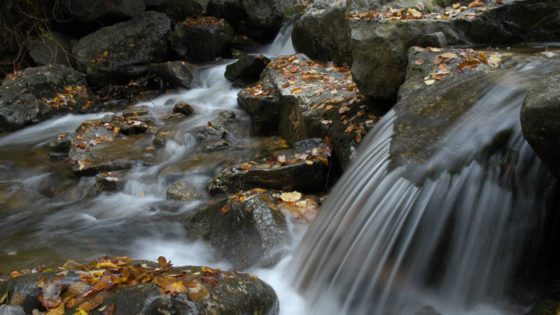Elwood, J.W., J.D. Newbold, A.F. Trimble, and R.W. Stark. 1981. Ecology 62(1):146–158.
Abstract
The limiting role of phosphorus on leaf decomposition and primary producers was investigated in a second—order woodland stream in Tennessee by experimentally enriching, for 95 d, adjacent reaches with an average of 60 and 450 mg PO4-P/L, respectively, over upstream control levels of °4 mg/L. Red oak (Quercus rubra) leaf packs in the enriched sections lost mass 24% faster than control packs (P < .05). Nitrogen content of the enriched packs increased 60% more, and P content increased 83% more than the respective increases in the control packs (P < .05). Differences in mass loss and N and P levels between the low and high enrichments were not significant (P > .05). Respiration rates of subsampled leaf discs were significantly higher than control rates only at the high level of enrichment. The increased respiration rates in the low and high enrichments accounted for 10 and 34% of the increased mass loss in the respective enriched sections, suggesting that the enrichment also produced increases in mechanical breakdown through faster microbial conditioning, increases in macroinvertebrate feeding, or both. Effects of the enrichment on aufwuchs initially consisted of increased chlorophyll a levels, followed by increased aufwuchs biomass levels. Dense growth of filamentous algae, including some Oscillatoria, which may be a nitrogen fixer, developed immediately downstream of P inputs. In addition, Nostoc, a known nitrogen-fixing blue-green alga, sampled after the enrichment, was significantly more abundant in the enriched sections than the control (P < .05). Densities of the snail, Goniobasis clavaeformis, a grazer-shredder sampled after the enrichment, also were significantly greater in the enriched reaches, suggesting that the lack of a sustained response of chlorophyll a to the enrichment may have been a result of increased grazing on algal biomass. These findings indicate that nutrient limitation of detrital processing is a significant factor in natural streams. The apparent increases in densities of benthic macroinvertebrates in the enriched sections, along with reported relationships between detrital food richness and macroinvertebrate growth and survivorship, suggest that nutrient limitation in streams also has ramifications on higher tropic levels.


